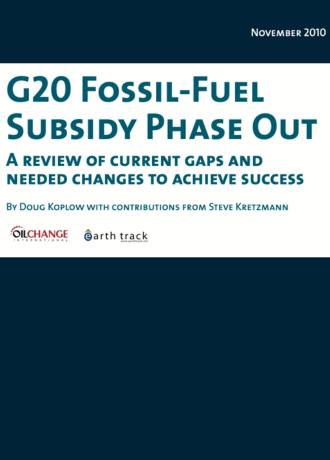
Report: G20 Fossil Fuel Subsidy Phase Out
G20 Fossil-Fuel Subsidy Phase Out: A review of current gaps and needed changes to achieve success
Oil Change International & Earth Track
November 2010
Download the full report, G20 Fossil-Fuel Subsidy Phase Out (PDF)
The Economist: “Green view: How to save $300 billion,” November 12, 2010.
Financial Times: Alan Beattie, “G20 countries accused of fossil fuel inaction,” November 7, 2010.
 This report, prepared by Oil Change International and Earth Track, is the first independent evaluation of the success of the G20 Pledge to phase out fossil fuel subsidies. The report reveals large gaps in the reporting of subsidies and that no new actions have been taken by G20 nations as a result of their commitment in Pittsburgh to phase out fossil fuel subsidies.
This report, prepared by Oil Change International and Earth Track, is the first independent evaluation of the success of the G20 Pledge to phase out fossil fuel subsidies. The report reveals large gaps in the reporting of subsidies and that no new actions have been taken by G20 nations as a result of their commitment in Pittsburgh to phase out fossil fuel subsidies.
In Pittsburgh in September 2009, G20 leaders pledged to “rationalize and phase out over the medium term inefficient fossil fuel subsidies that encourage wasteful consumption.” Reports and country submissions documenting G20 progress were released publicly in August 2010. Oil Change International and Earth Track examined and evaluated these public documents to conduct the study.
“The G20 is neither revealing nor removing fossil fuel subsidies,” said Steve Kretzmann of Oil Change International. “Each G20 country has defined ‘inefficient fossil fuel subsidy’ as they like, reported on what they want, and then listed either no subsidies, or things that they had already said they were doing.”
“There is no accountability, no oversight and review, no actual mechanism to hold these leaders to their words. Some of the analysis coming out of the OECD and IEA is quite helpful, but so far, in the process itself, there’s just no action behind the words of the G20,” said Kretzmann.
The report evaluates the quality of the reporting on subsidies by comparing G20 data with other available sets of data on subsidies. It also analyzes the reasons given for excluding subsidies from phase out and provides recommendations for ways forward on subsidy reform with the G20, or another institution such as the World Trade Organization or the United Nations Framework Convention on Climate Change.
